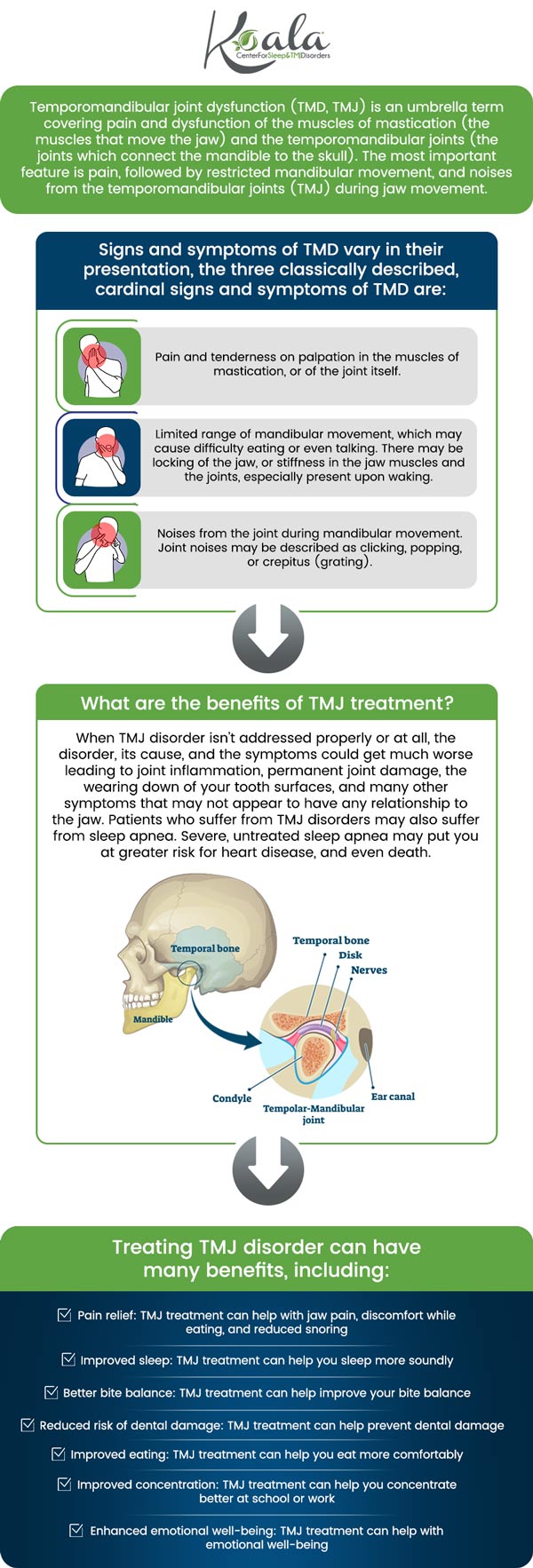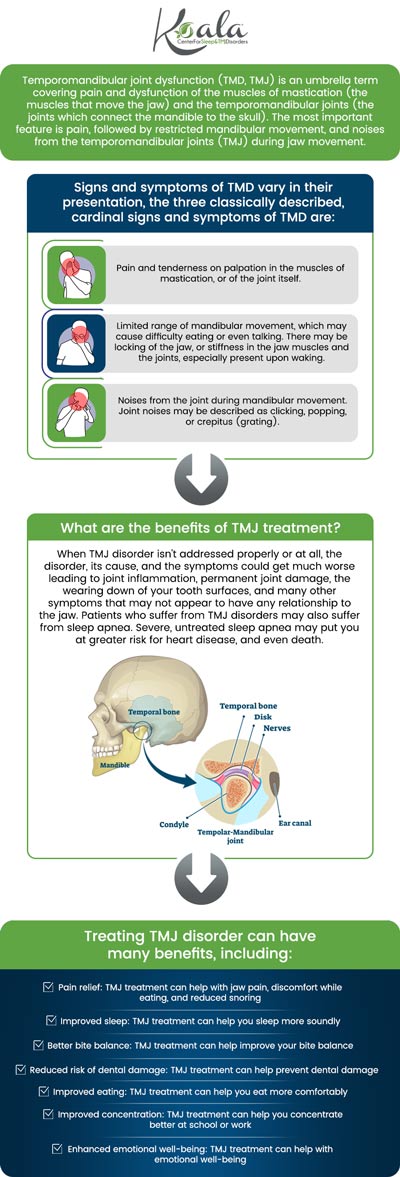Symptoms and Causes of TMJ Headaches
TMJ headaches result from jaw joint dysfunction, causing muscle tension, inflammation, and nerve irritation. Symptoms include jaw pain, facial soreness, clicking sounds, ear pain, and headaches that radiate to the temples, forehead, or neck. At Koala® Center For Sleep & TMJ Disorders, our experts provide effective TMJ headache treatments for lasting relief. For more information, please contact us today or request an appointment online. We have convenient locations in Bloomington IL, Peoria/Dunlap IL, El Paso TX, and Wausau WI.




Table of Contents:
Are headaches a symptom of TMJ?
What causes TMJ headaches?
How do you treat TMJ headaches?
What does a TMJ headache feel like?
TMJ is a disorder that causes pain in the joints of the jaw. It has a long list of symptoms, as it can impact many different areas of the body, going beyond just the jaw joint. One of the common symptoms of TMJ disorders is headaches, caused by the pain in the jaw spreading up to the top portion of the head. Patients who suffer from TMJ can experience severe headaches from the smallest amount of pain in the jaw, due to the number of nerves that reside in the same area as the temporomandibular joint, where TMJ disorders occur.
Headaches related to TMJ have two main causes – bruxism and malocclusion. Bruxism is when the teeth clench and grind, which will put pressure on the joints and muscles, causing pain. The pain will radiate up from the jaw to the temples, causing the headache, or from cramping in the jaw muscles. Malocclusion is having a misaligned bite, which puts strain on the jaw and throws it out of alignment. This will also cause headaches as the muscles in the jaw work to keep the jaw in the right place.
TMJ headaches are caused by two primary conditions that impact the way the jaw joint works and moves. The first cause of headaches related to TMJ is bruxism, more commonly known as the unconscious clenching of the jaw or the unconscious grinding of the teeth together. These actions put additional stress and strain on the jaw, causing it to become fatigued and experience pain. The pain will then radiate from the jaw up to the upper portion of the head, typically resulting in a headache forming at the temples. The second cause of headaches related to TMJ disorder is malocclusion.
This condition is the result of a person’s bite not properly lining up, meaning the teeth don’t match up the way they are supposed to. Additional strain is put on the jaw as the muscles work to align the bite, which can result in the jaw also getting thrown out of its alignment as well. This strain and stress cause the jaw muscles to become fatigued, resulting in a headache.
TMJ headaches can appear similar to tension headaches, with people often mistaking one for the other. Unfortunately, headaches caused by TMJ disorder don’t respond well to treatment used for tension headaches. It can take several tries before finding the right treatment for TMJ headaches that works for you, as everyone will respond differently to treatments. There are multiple treatment options available through working with a doctor familiar with TMJ headaches, they will ensure that the right types of treatment are tried and changed until a successful treatment is found.
Prior to starting treatment, a doctor will first need to confirm that the headaches you are experiencing are in fact the result of TMJ, as most of the treatments involve treating the issue with the jaw. Options for treatment include pain relievers or muscle relaxants, as well as prescribed injections, all to treat the pain. Preventative treatments also exist to lessen the severity of symptoms and decrease the frequency and likelihood of developing headaches. These include jaw exercises, stress reduction, regular exercise, splints, mouthguards, warm compresses or ice packs, soft foods, Marjoram tea, peppermint or eucalyptus oil, and acupuncture.
Like most other medical conditions, a TMJ headache will feel different from one person to the next. The feeling of a headache caused by my TMJ will also differ depending on if the patient is experiencing bruxism or malocclusion that is causing headaches to develop. Headaches can come in the form of mild, dull aching pain felt in the temples to a sharp, throbbing pain in the forehead and/or temples. They can also have a shooting pain felt up the back of the head, sinus pain, and feeling that the scalp or hair is painful to the touch. There is a wide range of additional symptoms that people can experience in conjunction with their TMJ headaches such as neck and shoulder stiffness and pain, dizziness or vertigo, pain in the cheek muscles, ringing in the ears, sensitivity to light, and many more. If you are experiencing headaches that aren’t responding to traditional over-the-counter treatments, contact us today or request an appointment online. We have convenient locations in Bloomington IL, Peoria/Dunlap IL, El Paso TX, and Wausau WI.

Additional Services You May Need
▸ KoalaKIDZzz®
▸ Sleep Apnea
▸ Snoring
▸ TMJ Disorder
▸ Fatigue
▸ Sleep Disorders
▸ Weight Loss
▸ CPAP Alternative
▸ Oral Appliances




